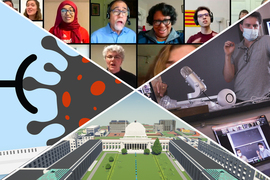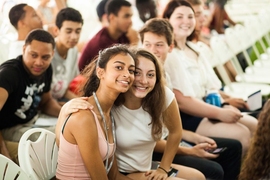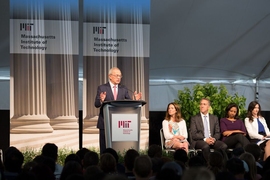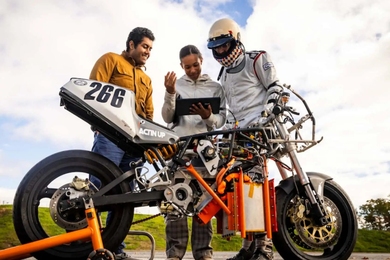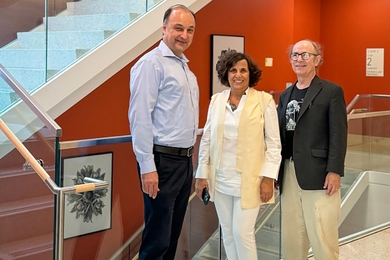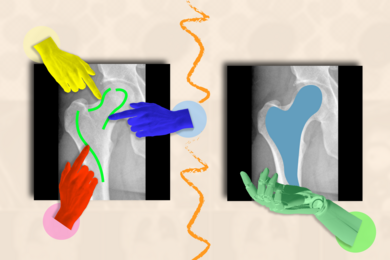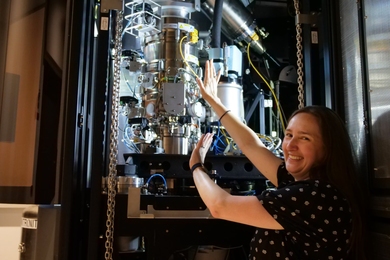As the sun broke through the clouds on a breezy Monday morning, first-year students and their families gathered on Kresge Oval for MIT’s Convocation, the Institute’s annual welcome to the incoming class.
The ceremony marked one of the first major events MIT has hosted on campus since the start of the Covid-19 pandemic. And while some aspects of the occasion were shaped by the ongoing pandemic — notably, masks were required of all who attended — the message to the 1,184 members of MIT’s Class of 2025 was one of hope, connection, and gratitude.
“Whether you know it or not, along with your suitcases, your boxes, your duffel bags, and your satchels, you also brought a gift to our community,” said President L. Rafael Reif in welcoming the incoming class. “You brought to us a gift of your talent, your energy, your curiosity, your creativity, and your drive. And you cannot imagine how grateful we are for that.”
As guests settled into their seats under a large and airy tent, the event opened with “Diary of a Pandemic Year,” a virtual performance that was written, composed, produced, and performed by hundreds of MIT musicians and community members.
“It is a homemade MIT masterpiece,” Reif said of the composition. “It offers a marvelous taste of so many things we love about MIT: a wonderful mix of people and backgrounds, the pleasure we take in making things together, and the energy and creative aspiration of everyone we meet.”
“Your new home”
Reif recalled first arriving at MIT in 1980 as an assistant professor of electrical engineering and computer science — “Which is course…?” he asked of the new students, to which they confidently shouted back, “Six!”
Having grown up in Caracas, Venezuela, with an accent that was shaped 2,000 miles south of Cambridge, Reif was anxious about fitting in at MIT. But he quickly found that, like him, many at MIT “came from somewhere else, and they cared about helping each other, and helping society.”
Joining Reif onstage were several senior members of the MIT administration: Provost Martin Schmidt, Chancellor Melissa Nobles, Vice Chancellor for Undergraduate and Graduate Education Ian Waitz, and Vice Chancellor and Dean for Student Life Suzy Nelson. Reif briefly introduced each of them, noting that they represent essential pieces of a rich support system available to MIT students.
“You’re surrounded by a community that cares about you,” he said. “All of us are dedicated to your success, and we believe in you.”
Moments to meander
Reif then introduced three members of the MIT faculty, who also happen to be MIT alumni: Shankar Raman ’86, section head and professor of literature; Evelyn Wang ’00, the Ford Professor of Engineering and head of the Department of Mechanical Engineering; and Steven D. Eppinger ’83, SM ’84, ScD ’88, the General Motors Leaders for Global Operations Professor of Management at MIT’s Sloan School of Management.
Raman, Wang, and Eppinger each spoke about living and learning at the Institute. For Raman, the MIT experience started out predictably enough. He recalled arriving as an undergraduate from India, “determined to major in Course 6 and emerge an electrical engineer.”
He also loved literature and philosophy, and on his way toward an engineering degree he sampled courses in German, poetry, and Western philosophy. After signing up for a filmmaking class, he stumbled upon MIT’s Department of Architecture, where the course was taught at the time. This encounter sprouted a new path, and Raman went on to earn degrees in both electrical engineering and architecture.
“Whatever your major, remember these four years are probably the only ones in your life where you can meander — where you can decide to not follow the main avenue, but to follow oblique paths and detours, to discover new areas of study,” he said.
His career continued to take unexpected turns. While pursuing a master’s in electrical engineering from the University of California at Berkeley, he realized that “my heart wasn’t fully in it.” So, he switched fields entirely, earning a PhD in literature from Stanford University. In 1995, he returned to MIT as a faculty member in the MIT Literature Section, and today serves as its head, teaching classes in Shakespeare, postcolonial fiction, and perspectives on artificial intelligence.
“I had come to MIT to become an electrical engineer, and I had certainly learned that,” Raman said. “But MIT also taught me how not to be one. And for that lesson, I will be forever grateful, and I hope it’s one you all will experience.”
“You’ve got this”
As a first-year herself, Evelyn Wang recalled setting out with energy, ready to “bring my ‘A’ game.” But her older brother, who also had attended MIT, warned her about “the wicked-hard problem sets,” and that she might not always get the A’s she was accustomed to in high school.
“Getting straight A’s is really, really tough,” Wang said. “You’re probably going to get a B, and maybe even a C or D, and that’s okay. I got an F on my first physics exam. Grades are only one way to measure what you’ll learn here.”
She offered tips for students to make the most of their time at MIT. The first is to be resilient and keep from dwelling on stress.
“Take breaks when you need to. Walk along Memorial Drive. Take a sailing class on the Charles. Tinker with a pet robot. Then get back to the problem sets,” Wang said. “You’ve got this.”
She also encouraged students to build a community — of friends, professors, and loved ones back home — who can support, advise, and ground them as they navigate the next four years.
Wang also reminded students to stay healthy, and pace themselves — advice she learned the hard way as an undergraduate. During a particularly grueling week, she recalled getting very little sleep while attempting to finish multiple class projects. She and her friends were fueled by cans of Mountain Dew, which they erected at the end of the ordeal, in a massive “victory tower.”
“Afterward, I slept for 36 hours straight,” Wang said. “Even when you are young, your body will fall apart if you do that every week. Please hydrate, and maybe drink less Mountain Dew than I did.”
“You are not alone”
As a newly arrived first-year at a similar MIT welcome event, Steven Eppinger remembered being given an obvious yet unsettling reality check.
“A speaker warned us, ‘half of you will be at the bottom half of the class,’” Eppinger said, drawing laughter from the crowd after a beat. “That statistical reality really struck me. Here we were, all these highly accomplished students, being told we may be average or worse. How could I process that?”
He did so by being open to imperfection. He came to MIT on a chemistry scholarship and had been the top chemistry student in both his high school and his state. At MIT, though, he quickly learned to redefine his expectations. “I was not devastated to score poorly on several chemistry exams in my first year,” he said.
Instead, he expanded his interests, by pledging a fraternity, joining the crew team, and participating in design challenges, a talent show, and even some campus hacks — all of which gave him a sense of community and helped to put his heavy courseload into perspective.
He encouraged the Class of 2025 to explore, and to reach out — to study groups, teaching assistants, advisors, and MIT’s Student Support Services — for help along the way.
“You are not alone in this journey,” said Eppinger, closing with a hopeful vision for the future:
“All of you are going to play a role in changing the world, through science and engineering, and a range of humanitarian endeavours,” he said. “You are going to be people of great consequence, who will do great things.”







